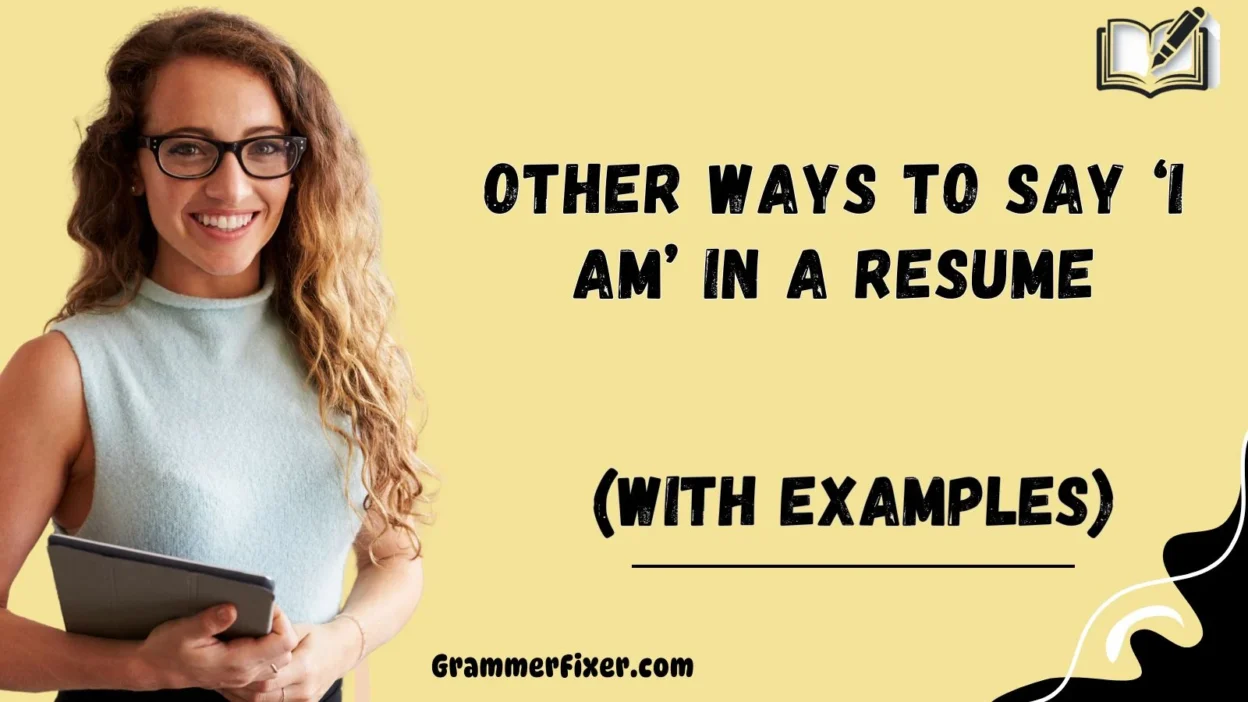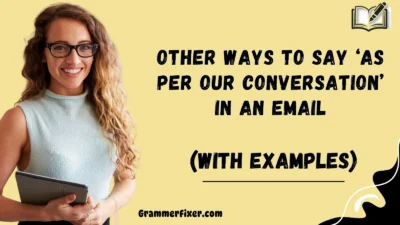Choosing the right words on a resume can feel overwhelming. So often, people default to writing “I am” when describing their achievements, but this can sometimes make resumes feel repetitive or less impactful. Finding thoughtful alternatives allows you to showcase your skills, experiences, and accomplishments in a way that feels personal, professional, and warm.
The synonyms below will help you avoid repetitive phrasing while adding clarity, strength, and positive tone to your resume.
What Does “I Am” Mean?
At its core, “I am” is a declaration of identity, capability, or quality. On a resume, however, recruiters prefer action verbs and strong phrasing that show impact. Instead of simply stating “I am skilled in project management,” you can use dynamic expressions like “Skilled in project management” or “Possess strong project management expertise.”
When to Use “I Am”?
Use “I am” only when you want to express personal ownership or a defining quality in a summary section or cover letter. For example:
- “I am a dedicated professional with a proven record of leading cross-functional teams.”
However, in bullet points, it’s best to drop “I am” and begin directly with a power verb.
Is It Professional/Polite to Say “I Am”?
Yes, “I am” is polite and grammatically correct, but in resumes it can sometimes come across as less concise. Recruiters prefer short, impactful statements that convey results rather than self-descriptions.
Pros or Cons of Using “I Am”
Pros:
- Conveys ownership and identity
- Works well in summary or cover letters
- Sounds authentic and human
Cons:
- Can sound repetitive
- Weak compared to action verbs
- Takes up space without adding strong impact
1. Skilled in
Meaning: Demonstrates ability in a specific area.
Detailed Explanation: A concise way to showcase technical or professional strengths.
Scenario Example: “Skilled in digital marketing strategy and content development.”
Best Use: Resume skills or summary section.
Worst Use: Avoid using it too generally, e.g., “Skilled in work” (too vague and unhelpful).
Tone: Confident, professional.
2. Experienced in
Meaning: Highlights practical background.
Detailed Explanation: Ideal for emphasizing years of practice in a field.
Scenario Example: “Experienced in project management and cross-team collaboration.”
Best Use: Professional summary or bullet points.
Worst Use: Using without proof, e.g., “Experienced in leadership” with no supporting evidence.
Tone: Professional, credible.
3. Proficient in
Meaning: Shows advanced competency.
Detailed Explanation: More specific than “skilled,” indicates comfort and fluency.
Scenario Example: “Proficient in HTML, CSS, and JavaScript.”
Best Use: Technical skills and tools.
Worst Use: When only beginner-level knowledge exists — recruiters may expect mastery.
Tone: Concise, technical.
4. Accomplished in
Meaning: Proven track record of success.
Detailed Explanation: Signals recognition and achievement.
Scenario Example: “Accomplished in leading marketing campaigns exceeding KPIs.”
Best Use: Career highlights, achievements.
Worst Use: Using for routine tasks (e.g., “Accomplished in sending emails”). It undermines credibility.
Tone: Strong, authoritative.
5. Adept at
Meaning: Highly capable, quick to adapt.
Detailed Explanation: Suggests fluency and flexibility.
Scenario Example: “Adept at solving complex analytical problems.”
Best Use: Problem-solving, creative fields.
Worst Use: Overusing it for too many skills at once — it can look inflated.
Tone: Dynamic, adaptive.
6. Possess
Meaning: Owns or carries qualities.
Detailed Explanation: A formal way to describe attributes and qualifications.
Scenario Example: “Possess strong leadership and organizational skills.”
Best Use: Summary or qualifications section.
Worst Use: Using with generic words, e.g., “Possess good communication” — sounds weak and vague.
Tone: Formal, direct.
7. Recognized for
Meaning: Highlights external acknowledgment.
Detailed Explanation: Adds credibility by showing that others have validated your skills.
Scenario Example: “Recognized for consistent sales achievements exceeding goals.”
Best Use: Career highlights, awards, and achievements.
Worst Use: Using it without actual recognition — can appear misleading.
Tone: Positive, credible.
8. Known for
Meaning: Defines reputation.
Detailed Explanation: Indicates how peers, leaders, or clients view you.
Scenario Example: “Known for innovative problem-solving approaches.”
Best Use: Professional summary to build a strong personal brand.
Worst Use: In bullet points — it can feel informal and vague.
Tone: Personal, authentic.
9. Demonstrated ability in
Meaning: Shows proven skills.
Detailed Explanation: Emphasizes evidence and action over self-description.
Scenario Example: “Demonstrated ability in managing cross-functional teams.”
Best Use: Describing major projects or measurable results.
Worst Use: Overusing without results to back it up.
Tone: Strong, professional.
10. Track record of
Meaning: Proven history of success.
Detailed Explanation: Implies consistent and repeated achievement.
Scenario Example: “Track record of exceeding client expectations.”
Best Use: Professional summary or key accomplishments section.
Worst Use: Claiming a track record for something minor, e.g., “Track record of answering calls.”
Tone: Results-oriented.
11. Proven ability to
Meaning: Validated skills with evidence.
Detailed Explanation: Excellent for recruiters who want quantifiable success.
Scenario Example: “Proven ability to streamline processes and reduce costs.”
Best Use: Results and achievements section.
Worst Use: Without evidence — can sound like a buzzword.
Tone: Strong, credible.
12. Successful in
Meaning: Highlights positive results.
Detailed Explanation: Focuses on results and outcomes rather than tasks.
Scenario Example: “Successful in delivering high-impact proposals.”
Best Use: Project outcomes and KPIs.
Worst Use: Without context, e.g., “Successful in everything I do.” Sounds arrogant.
Tone: Optimistic, results-driven.
13. Capable of
Meaning: Able to effectively perform tasks.
Detailed Explanation: Shows readiness and flexibility.
Scenario Example: “Capable of managing multiple projects simultaneously.”
Best Use: Skills, responsibilities, or technical expertise.
Worst Use: Using as filler, e.g., “Capable of working.” Too generic.
Tone: Professional, neutral.
14. Effective at
Meaning: Emphasizes efficiency and productivity.
Detailed Explanation: Shows the ability to achieve results with precision.
Scenario Example: “Effective at fostering collaboration across teams.”
Best Use: Leadership and collaboration contexts.
Worst Use: Without evidence or results — “Effective at everything” is vague.
Tone: Strong, collaborative.
15. Adequately versed in
Meaning: Sufficiently knowledgeable in an area.
Detailed Explanation: Indicates competence but not mastery.
Scenario Example: “Adequately versed in financial reporting tools.”
Best Use: Skills you are comfortable with but not deeply specialized in.
Worst Use: On key qualifications — it may undersell you.
Tone: Neutral, modest.
16. Equipped with
Meaning: Prepared and resourced with skills.
Detailed Explanation: Shows readiness to handle responsibilities.
Scenario Example: “Equipped with strong analytical and problem-solving skills.”
Best Use: Professional summary.
Worst Use: Using with soft skills only, e.g., “Equipped with kindness.” Too casual.
Tone: Prepared, confident.
17. Gifted at
Meaning: Naturally talented or exceptional at something.
Detailed Explanation: Suggests unique ability or strength.
Scenario Example: “Gifted at creative content development.”
Best Use: Creative, innovative roles.
Worst Use: In formal/technical fields where modesty is expected.
Tone: Creative, slightly informal.
18. Talented in
Meaning: Demonstrates ability and flair.
Detailed Explanation: A softer, warmer way of expressing skill.
Scenario Example: “Talented in developing engaging marketing campaigns.”
Best Use: Creative, design, or artistic resumes.
Worst Use: Overusing in technical fields where evidence is more valued.
Tone: Positive, personable.
19. Specialize in
Meaning: Focuses on a specific area of expertise.
Detailed Explanation: Indicates depth of knowledge.
Scenario Example: “Specialize in digital marketing and social media strategy.”
Best Use: Industry-specific or technical roles.
Worst Use: Claiming specialization in too many areas — dilutes credibility.
Tone: Focused, authoritative.
20. Excel at
Meaning: Performs exceptionally well.
Detailed Explanation: Conveys excellence and above-average performance.
Scenario Example: “Excel at building client relationships and closing deals.”
Best Use: Sales, leadership, or results-focused roles.
Worst Use: Using without measurable evidence — can sound exaggerated.
Tone: Confident, strong.
21. Adept in
Meaning: Skilled and knowledgeable.
Detailed Explanation: Similar to “adept at,” but often used for technical or formal areas.
Scenario Example: “Adept in data analysis and interpretation.”
Best Use: Technical or analytical contexts.
Worst Use: For soft skills — sounds awkward, e.g., “Adept in teamwork.”
Tone: Formal, professional.
22. Known as
Meaning: Establishes professional reputation.
Detailed Explanation: Communicates what people identify you with.
Scenario Example: “Known as a collaborative team player and reliable leader.”
Best Use: Professional summary.
Worst Use: In bullet points — can feel informal.
Tone: Authentic, personal.
23. Strong background in
Meaning: Highlights career foundation.
Detailed Explanation: Conveys stability and depth of knowledge.
Scenario Example: “Strong background in financial analysis and forecasting.”
Best Use: Summary, career highlights.
Worst Use: For beginner-level skills — it can appear misleading.
Tone: Professional, credible.
24. Well-versed in
Meaning: Deeply knowledgeable.
Detailed Explanation: Suggests comfort and expertise in a field.
Scenario Example: “Well-versed in front-end development tools.”
Best Use: Technical expertise, industry-specific skills.
Worst Use: Overusing for common abilities, e.g., “Well-versed in Microsoft Word.”
Tone: Strong, technical.
25. Fluent in
Meaning: Complete proficiency.
Detailed Explanation: Can be used for languages or technical skills.
Scenario Example: “Fluent in Spanish and English.”
Best Use: Languages, coding, communication skills.
Worst Use: Overclaiming language ability — may be tested.
Tone: Professional, precise.
26. Mastery of
Meaning: Highest level of expertise.
Detailed Explanation: Signifies authority and control in an area.
Scenario Example: “Mastery of Adobe Creative Suite.”
Best Use: Technical expertise, advanced skills.
Worst Use: Overuse — can appear arrogant without proof.
Tone: Strong, authoritative.
27. Dedicated to
Meaning: Shows commitment.
Detailed Explanation: Emphasizes values and work ethic.
Scenario Example: “Dedicated to fostering collaborative work environments.”
Best Use: Professional summary.
Worst Use: Using for tasks instead of values, e.g., “Dedicated to checking emails.”
Tone: Warm, professional.
28. Committed to
Meaning: Displays ongoing dedication.
Detailed Explanation: Indicates passion and alignment with goals.
Scenario Example: “Committed to delivering exceptional client service.”
Best Use: Professional summary, cover letters.
Worst Use: Using without substance — can sound cliché.
Tone: Positive, human-centered.
29. Driven by
Meaning: Shows motivation and inspiration.
Detailed Explanation: Great for expressing personal passion.
Scenario Example: “Driven by results and continuous improvement.”
Best Use: Summary, mission statements.
Worst Use: If over-personalized, e.g., “Driven by coffee.” Too casual.
Tone: Motivational, energetic.
30. Passionate about
Meaning: Conveys enthusiasm.
Detailed Explanation: Adds warmth and energy.
Scenario Example: “Passionate about creating user-friendly digital products.”
Best Use: Summary, cover letter.
Worst Use: Without connection to the job — “Passionate about football” doesn’t fit a resume.
Tone: Enthusiastic, engaging.
Conclusion
Using synonyms for “I am” on your resume helps you convey strengths, skills, and achievements in a way that is engaging, clear, and professional. Each alternative comes with its best use and worst use, reminding you that word choice matters depending on context, tone, and audience.



